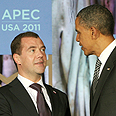
Obama: Iran sanctions have 'enormous bite'
US president defends economic sanctions, avoids directly addressing possible military action against Islamic Republic but says 'nuclear Iran would pose threat not only to the region but also to the US'
US President Barack Obama defends his efforts to contain Iran's nuclear ambitions, saying that economic sanctions against Tehran have had "enormous bite," and that he will consult with other nations on additional steps to ensure that Iran does not acquire an atomic weapon.
Obama expressed confidence that Russia and China in particular understand the threat a nuclear armed Iran would pose, and said their leaders agree that Iran cannot weaponize its nuclear power and trigger a nuclear arms race in the region.
Related storie:
- Iran 'attacked by another computer virus'
- US blog: Mossad behind Iran blast
- Senior officer killed in Iran blast
The president, at a news conference during an Asia-Pacific economic summit, did not specifically say he would consider military action if Tehran were to persist in arming itself with a nuclear weapon. But he added: "We are not taking any options off the table. Iran with nuclear weapons would pose a threat not only to the region but also to the United States."
Obama answered a range of questions, from the status of the congressional Supercommittee looking to reduce deficits to China's currency, illustrating the competing issues crowding his agenda as he heads into a presidential election year.
For the president, the news conference was his first opportunity to address a report Friday from the International Atomic Energy Agency that provided new evidence that Iran's nuclear program includes clandestine efforts to build a bomb.
The report, circulated among the UN watchdog agency's member countries, alleges Iran has been working to acquire equipment and weapons design information, testing high explosives and detonators and developing compute models of a warhead's core. Taken together, it's the most unequivocal evidence yet that the Iranian program ranges far beyond enriching uranium for use in energy and medical research, which is what Tehran says it's for.
In meetings Saturday with Russian President Dmitry Medvedev and Chinese President Hu Jintao, Obama sought to rally support for putting new pressure on Iran's regime. But there was little public sign either country was ready to drop its opposition to additional sanctions.
The US has already slapped sanctions on dozens of Iranian government agencies, financial and shipping companies as well as officials over the nuclear program and could target additional institutions like Iran's Central Bank. And the UN has imposed four rounds of sanctions that have caused economic hardship in Iran, but have yet to force any change in the nuclear program.
"The sanctions have enormous bite and enormous scope," Obama said.
Obama declined to directly respond to criticism of his Iran policy from Republican presidential candidates Saturday, including former Massachusetts Gov. Mitt Romney's declaration that Obama's re-election would mean a nuclear armed Iran. But he took a swipe at his foes anyway.
"Now is this an easy issue?" he asked. "No, anyone who claims it is, is either politicking or doesn't know what they're talking about."
Waterboarding to continue?
He also rejected assertions from Republican candidates such as Herman Cain and Michele Bachmann that they would be willing to use the interrogation practice known as waterboarding, a simulated form of drowning, on suspected terrorists.
"Let me just say this: they're wrong," Obama said emphatically. "Waterboarding is torture, it's contrary to America's traditions, it's contrary to our ideals, that's not who we are, that's not how we operate. We don't need it ... and we did the right thing by ending that practice."
"Anyone who has read about and understands the practice of waterboarding would say that that is torture, period," he added.
Obama, hosting the APEC conference in his home state, took questions in the late afternoon sunshine of a quintessential Hawaii scene, with palm trees and blue waters sprawled out behind him.
The president challenged China to let its currency appreciate more rapidly and to end measures that take unfair advantage of foreign intellectual property.
"It's time for them to go ahead and move toward a market-based system for their currency," he said. "There is concern across the political spectrum that the playing field is not level right now."
He said he understood that exporters in China like the system as it is now because it makes Chinese products cheaper overseas and makes changes in the currency difficult politically in China. "I understand it, but the United States and other countries feel that enough is enough."
Obama sidestepped a question about his conversation more than a week ago with French President Nicolas Sarkozy at the G20 summit, in which reporters overheard Sarkozy calling Israeli Prime Minister Benjamin Netanyahu a "liar," and Obama replying "I have to work with him every day." Obama wouldn't comment on the language - but did say he voiced "significant disappointment" to Sarkozy about France's vote to admit Palestine as a member of the UN cultural organization. After the vote, the US cut its funding for UNESCO.
- Receive Ynetnews updates directly to your desktop











